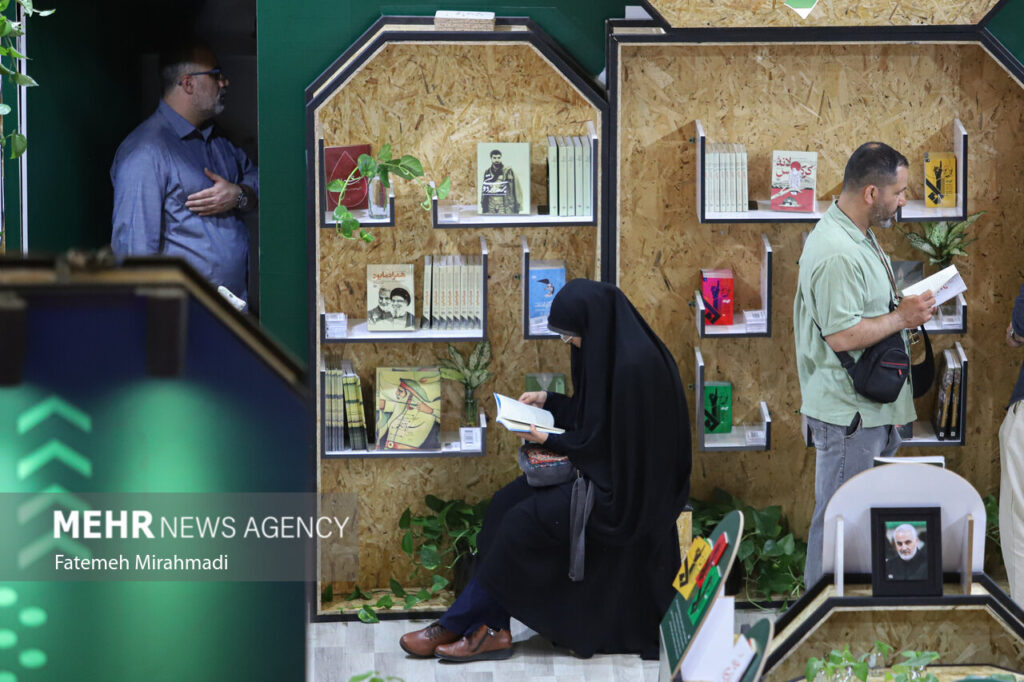The 36th Tehran International Book Fair published a variety of books on General Qassem Soleimani, including biographies, speeches, wills and wills, and explanations of his funeral processions.
Lieutenant General Qassem Soleimani and Iraqi commander Abu Mahdi al-Muhandis were assassinated in a US airstrike in 2020.
From academic analysis to children’s literature, there are many different forms of work that span genres, spanning genres.

Iranian publications reflect the enduring importance of Soleimani’s legacy, making his life and philosophy accessible to a wider audience.
Book fair organizers aim to promote translation of these works and expand their reach across Iranian borders.

Among the outstanding works is “Qassem,” considered Soleimani’s most comprehensive biographies. Written by Morteza Sarhangi, this book carefully documents the only life from childhood to martialism. Based on his speech and writings, this text includes direct stories with commentary from close relatives, ensuring authentic historical accounts.

Another notable entry, “Soleimani’s Theme Classification of Speech,” serves as a research tool and classifies speeches by repeating themes such as martianism and religious beliefs. Meanwhile, the “Jahat” series was published by “Hajj Qassem School” and provides a detailed interpretation of Soleimani’s public speech and gives readers a deep look at what he says.

For younger viewers, “I Not Hears als the Behans” is a cartoon-style book about Soleimani’s childhood, depicting his resilience in the face of injustice in the Pahlavi era.

Comic Strips are a series of comics placed in interrelated panels, displaying short humor, often forming a continuous story, and with text in balloons and captions.

“The Little Man” by Tayebeh (Tannaz) Shamani tells the story of Soleimani, 12, and shows his early sense of responsibility and problem-solving skills.
The book teaches children about selflessness and courage in challenging situations. This is the only book on Soleimani written in poetry.

“Direction” is the title of a collection of books from the Haj Qassem School Publications, which explains and explains the speech of Qassem Soleimani. Each volume of this series features one of his speeches, with the affirmation of what was mentioned in the second part of the book.

The “Hajj Qassem School” publication debuted in “I’m Fearing Nothing”, the autobiography of Qassem Soleimani (1957-1979). Featuring a note from Imam Khamenei, this volume edits Soleimani’s works from an early age at Kanath Malek, Kaman, through innovative activities until 1979. This book is also available in audio format.

Saeed Allamian’s “Hajj Qassem I Know” (Khat-e Moqaddam Publications) chronicles 40 years of friendship. Similarly, the book by Hojjatoleslam Ali Shirazi, which consists of 12 chapters, tells the memory of nearly 40 years with Soleimani, beginning with the Iran and Iraq War (the sacred defense) and the service of Shiraj under him.

Mohammad Mohammadinia and Asadura Mohammadinia’s “Lucky Friend, Hajj Qassem” presents a memoir of Soleimani, depicting similarities between him and figures like Marek Ashtar seen in the Quran and Hadith.

Written by Alemeh Tahmasbi, Leila Mousavi and Mahdi Qorbani, “Dear Soleimani” explores Soleimani’s life and struggles and contains a complete text of his will.

Notable works that further unravel the Hajj Qassem School include “Social Spirituality of the Soleimani School” (Institute of Islamic Culture and Thinking) and “Soleimani School” (Astan QUDS Razabi Publications).

The illustrated book entitled “The Cypress on the Move” is also available at TIBF 2025. The book depicts the farewell and lament of people at the glorious funeral of an Iranian role model.

The latest edition of TIBF began on Wednesday (May 7, 2025) with Iranian chairman Mohammad Bakar Kalibah attending.
With the motto “Let’s read for Iran,” the 36th TIBF is currently underway in the capital, Imam Khomeini Mosala until May 17th.
Iraq enjoyed an honorary guest at the 36th TIBF, which means important cultural exchanges between the two countries in line with Iran’s cultural diplomacy.
Reported by Tohid Mahmoudpour

